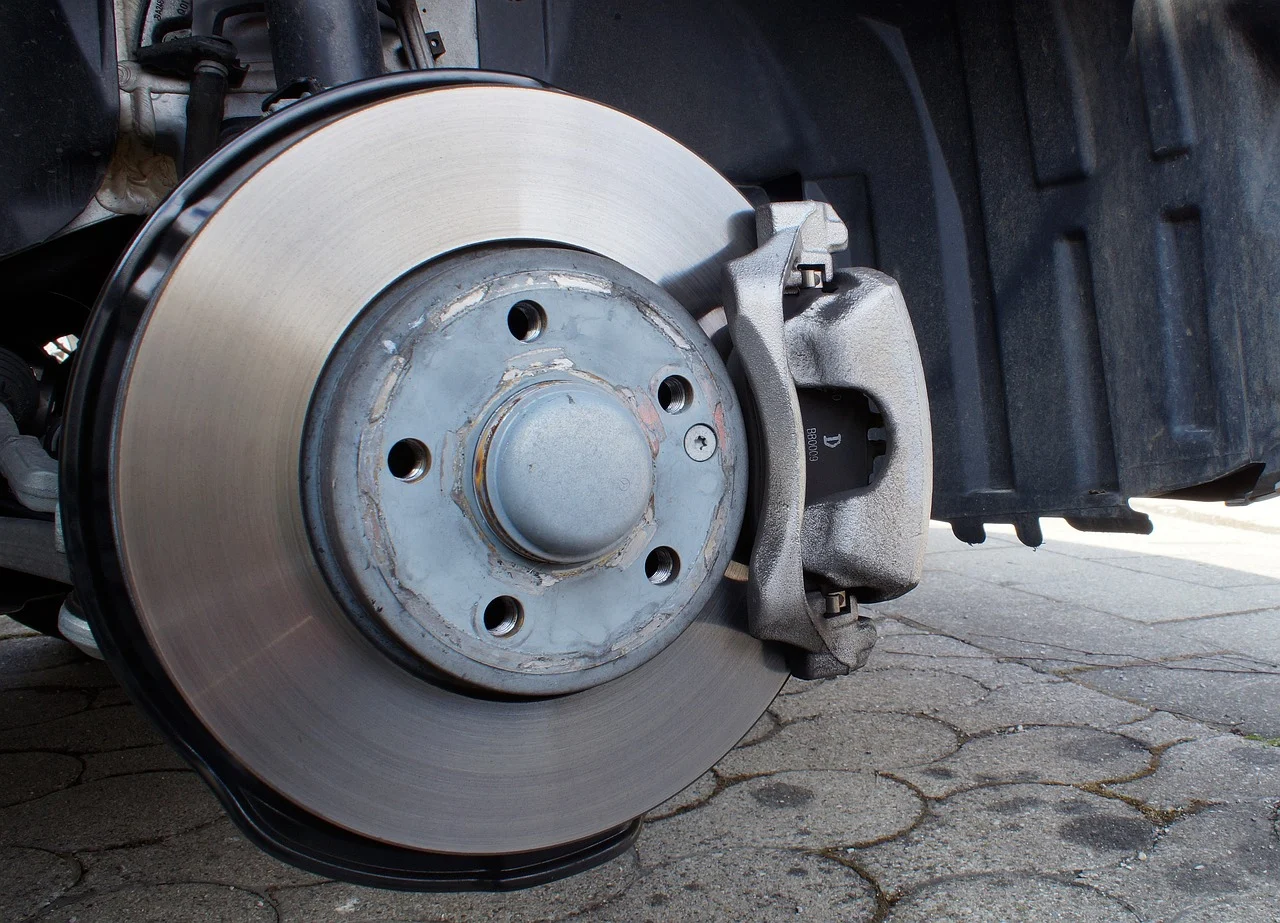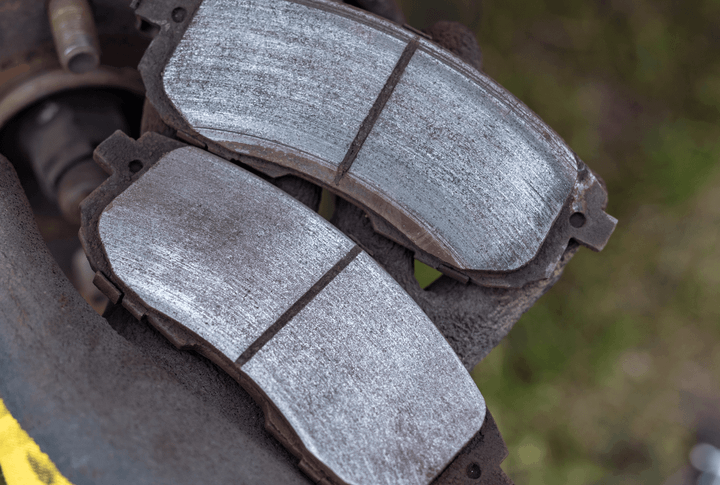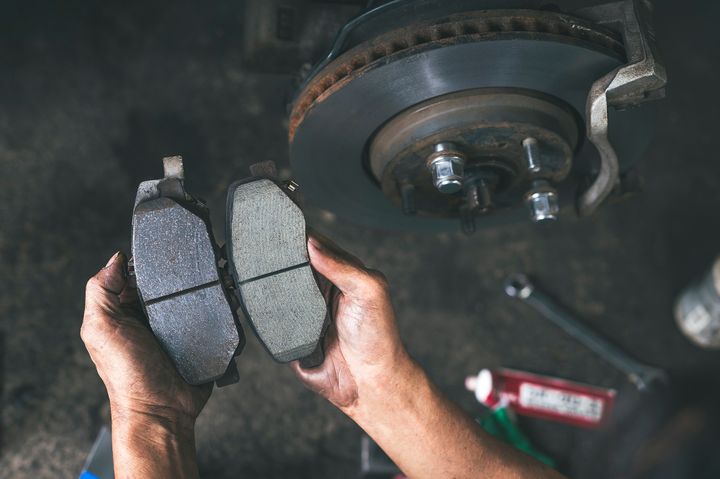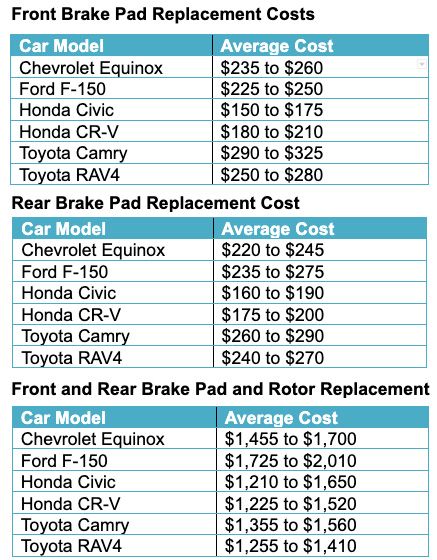


Brake pad replacement is a critical aspect of vehicle maintenance that ensures the safety and reliability of your car's braking system. The cost of replacing brake pads varies based on factors such as the make and model of your vehicle, the type of brake pads used, and the labor costs associated with the replacement process. This article explores the average cost of brake pad replacement, the factors influencing the price, and how to choose the right brake pads for your vehicle. We also discuss the signs indicating the need for brake pad replacement, the process involved, and tips to extend the life of your brake pads.

Timely brake pad replacement is crucial for maintaining the safety and performance of your vehicle. Worn-out brake pads can significantly increase stopping distances, reduce braking power, and even cause damage to other components of the braking system, such as the rotors. Understanding the factors affecting brake pad replacement costs helps you make informed decisions and ensures you get the best value for your money.

The average cost to replace brake pads on all four wheels ranges between $230 and $600 for parts and labor. This price varies depending on the specific make and model of your vehicle, the type of brake pads used, and whether the rotors also need to be replaced.
| Vehicle Type | Brake Pad Replacement Cost (Pads Only) | Brake Pad and Rotor Replacement Cost |
|---|---|---|
| Compact Car | $150 - $300 | $300 - $600 |
| Sedan | $200 - $400 | $400 - $800 |
| SUV | $250 - $500 | $500 - $1,000 |
| Pickup Truck | $300 - $600 | $600 - $1,200 |
| Luxury Vehicle | $400 - $800 | $800 - $1,600 |
Front brake pads typically wear out faster than rear brake pads due to the weight distribution of the vehicle during braking. As a result, front brake pad replacement may be more frequent and potentially more expensive than rear brake pad replacement.

Several factors influence the cost of brake pad replacement:
Vehicle make and model: Luxury and performance vehicles often require more expensive brake pads and may have higher labor costs associated with the replacement process.
Type of brake pad material: Brake pads are available in various materials, such as ceramic, semi-metallic, and organic. Each material has its own advantages and disadvantages, and the cost can vary accordingly.
Labor costs: The cost of labor varies depending on the location, the type of repair shop (dealership, independent mechanic, or chain store), and the complexity of the job.
Geographic location: Labor rates and parts prices differ based on the region or city where the brake pad replacement is performed.
Driving habits and conditions: Aggressive driving, frequent stop-and-go traffic, and harsh weather conditions can all contribute to faster brake pad wear, leading to more frequent replacements and higher costs.
When selecting brake pads for your vehicle, you can choose between OEM (Original Equipment Manufacturer) and aftermarket pads. OEM brake pads are designed specifically for your vehicle make and model, ensuring a perfect fit and optimal performance. Aftermarket brake pads are produced by third-party manufacturers and may offer a wider range of materials and price points.
The type of brake pad material you choose can also impact the performance, durability, and cost of your brake system. The three most common types of brake pad materials are:
| Brake Pad Type | Advantages | Disadvantages | Cost |
|---|---|---|---|
| Ceramic | - Quiet operation - Low dust production - Stable performance | - More expensive than other types - May wear rotors faster | $$$ |
| Semi-metallic | - Excellent heat dissipation - High performance in demanding conditions | - Noisier - Produces more dust compared to ceramic pads | $$ |
| Organic | - Most affordable - Smooth and quiet operation | - Wears out faster - Lower performance | $ |
Some brake pads also feature noise-reducing elements, such as shims or insulators, which help minimize brake noise and vibration. Additionally, wear indicators and sensors can alert you when your brake pads are nearing the end of their life, helping you schedule a timely replacement.
Knowing when to replace your brake pads is crucial for maintaining the safety and performance of your vehicle. Common signs indicating the need for brake pad replacement include:
Brake pad thickness: Most brake pads have a minimum thickness of around 3-4 millimeters. If your brake pads fall below this threshold, it is time to replace them.
Wear indicators: Many brake pads have built-in wear indicators that produce a squealing noise when the pads are nearing the end of their life.
Noise and vibration: If you experience grinding, squealing, or vibration when braking, it may be a sign that your brake pads are worn out or damaged.
Reduced braking performance: If you notice that your vehicle takes longer to stop or that the brake pedal feels soft or spongy, it may indicate that your brake pads need to be replaced.
Brake pad replacement can be performed either as a DIY project or by a professional mechanic. While DIY brake pad replacement can save you money on labor costs, it is important to have the necessary tools, knowledge, and experience to complete the job safely and correctly.
The brake pad replacement process typically involves the following steps:
Removing the wheels and inspecting the brake system
Removing the old brake pads and hardware
Cleaning and inspecting the brake calipers and rotors
Installing new brake pads and hardware
Reassembling the brake system and testing for proper operation
If you are not confident in your ability to replace your brake pads, it is best to have the work performed by a qualified mechanic.
When choosing a mechanic for your brake pad replacement, you have several options, including dealerships, independent mechanics, and chain stores. Dealerships often have the most up-to-date training and equipment but may also charge higher prices for their services. Independent mechanics and chain stores may offer more competitive pricing but may not have the same level of expertise or access to OEM parts.
To find a reliable mechanic for your brake pad replacement, consider the following:
Compare labor rates and parts prices from multiple shops
Check online reviews and ratings from previous customers
Verify that the mechanic or shop is certified and has experience working on your specific vehicle make and model
While brake pads are a wear item that will eventually need to be replaced, there are several steps you can take to extend their life and minimize the frequency of replacements:
Practice proper driving habits, such as avoiding aggressive braking and maintaining a safe following distance
Perform regular maintenance and inspections of your brake system to identify potential issues early on
Choose high-quality brake pads that are designed for your specific driving needs and conditions
By following these tips, you can help maximize the life of your brake pads and reduce the overall cost of ownership for your vehicle.
Delaying brake pad replacement can have serious consequences for your vehicle's safety and performance, as well as your wallet. Some of the potential consequences of driving with worn-out brake pads include:
Increased stopping distance, which can make it more difficult to avoid accidents or collisions
Damage to the brake rotors, which can result in more expensive repairs or replacements
Higher overall repair costs, as worn-out brake pads can cause damage to other components of the braking system
To avoid these consequences, it is important to have your brake pads inspected regularly and replaced as needed.
Brake pad replacement is a critical aspect of vehicle maintenance that should not be overlooked. By understanding the factors affecting brake pad replacement costs, choosing the right brake pads for your vehicle, and following proper maintenance and driving practices, you can ensure the safety and reliability of your vehicle's braking system while minimizing the overall cost of ownership. If you suspect that your brake pads may need to be replaced, have them inspected by a qualified mechanic as soon as possible to avoid potential safety hazards and more expensive repairs down the road.
On average, a complete brake job that includes new pads and rotors on both axles will cost between $500 and $1000. Exact pricing depends on the make and model of the vehicle, type of parts used, and labor rates.
In most cases, mechanics recommend replacing brake rotors along with the pads. Worn rotors can impact braking performance and lead to uneven wear on new pads.
Ceramic brake pads typically last longer than semi-metallic pads, with an average lifespan of 50,000-70,000 miles. Semi-metallic pads usually need replacement every 30,000-50,000 miles.
For even braking performance and balanced wear, it's best to replace brake pads on both the front and rear axles at the same time. However, front pads often wear faster and may need replacement sooner than the rear pads.
Driving with excessively worn brake pads can damage the rotors, leading to more expensive repairs. It also compromises braking performance and safety.
It's recommended to have your brakes inspected at every oil change or tire rotation, typically every 5,000-7,500 miles. This allows for early detection of wear and timely replacement.
While it is possible to replace brake pads as a DIY project, it requires proper tools, knowledge, and safety precautions. Incorrectly installed brakes can be dangerous, so it's often best to have the work done by a professional.
If your brakes feel different after pad replacement, it could indicate air in the brake lines or improperly seated pads. Return to the mechanic promptly for inspection and correction.
Yes, new brake pads should be properly bedded or burnished to transfer an even layer of friction material onto the rotors. Follow the specific break-in procedure recommended by the brake pad manufacturer.
Most mechanics suggest replacing brake pads when they wear down to 3-4 millimeters in thickness. Pads typically start with 10-12mm of friction material when new.

Miguel started tinkering with car radios as a teenager, fascinated by the intricate dance of wires and circuits. This passion led him to pursue a career as an automotive electrician. For the past 10 years, Miguel has tackled everything from flickering headlights to mysterious electrical gremlins. He thrives on troubleshooting electrical problems and enjoys sharing his knowledge to empower car owners to understand their vehicles better.







